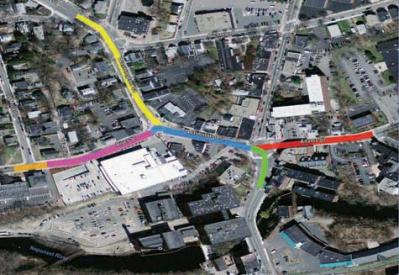March 2, 2011
 Lower Mills MWRA map. Click to enlarge.
Lower Mills MWRA map. Click to enlarge.
Fasten your seatbelts, Lower Mills residents.
Starting next month and running into November, Washington Street, Adams Street, and River Street are scheduled to be periodically closed as part of a project of rehabbing and replacing a major pipeline that distributes water to the area.
The news has left some local business owners concerned that they haven’t received enough information and that the road closures will negatively impact their businesses, potentially forcing some of them to shut their doors for good.
“At this point we’re totally in the dark and somewhat disappointed by that so late in the game,” said Anthony Paciulli, president of Meetinghouse Bank on Dorchester Ave. and head of the Lower Mills Merchants Association. “We thought we’d be a little more involved.”
Given the difficult economy and a challenging winter, the interruption in business due to the project could lead to some businesses closing, merchants said. “There are some folks who have been struggling,” Paciulli said.
Ria Convery, a spokeswoman for the Massachusetts Water Resources Authority, the agency that is spearheading the rehab project, said they have been in contact with city officials and neighborhood organizations.
The $14.5 million project has been planned for a while, she said, and details are emerging now about the work at Lower Mills as the contractor starts to mobilize. Construction began on Adams St. in East Milton Square last February.
The project involves refurbishing a pipeline, built in the early 1900s, that distributes water for Milton, Quincy and the southeast corner of Boston. According to the MWRA, some sections of the pipeline are old and functioning at 50 percent capacity because of rust build-up and pocking along the pipeline’s walls.
The first three phases, out of five total, are completed, including connections to the MWRA’s new Blue Hills storage facility.
The agency says the project will extend the lifespan of the pipeline by 50 years and provide a back-up in case of a major water main break.
If the weather permits, the contractor may start work in Lower Mills next month, Convery said.
When asked about concerns over potential businesses closing, Convery said, “We will be working closely with everybody to ensure that doesn’t happen.”
When a street is closed, access will be provided to get to the businesses, she said. “When they get to River St. they’ll be able to get to Shaw’s from Washington St.,” she added.
MWRA officials will be meeting with business owners on March 10 at Meetinghouse Bank, ahead of the merchants’ association’s regular monthly meeting on March 30, which MWRA officials were also slated to attend. Separately, MWRA officials are expected to appear before the Lower Mills Civic Association on March 15 in St. Gregory’s auditorium at 7 p.m.
Dorchester’s City Councillor, Maureen Feeney, whose district includes the impacted area, said she is expecting to join city officials in spending significant amounts of time attempting to minimize the impact of the project on the neighborhood’s small businesses.
She said the project will likely be more disruptive than another project in her district – the repairs to the Neponset River Bridge – which has caused traffic back-ups. “It will have a tremendous impact,” she said of the project, adding that it is federally mandated. “There’s no way around this.”
She added: “This is going to be ugly. It is just going to be ugly. There’s no good news here other than it has to be done.”
State Rep. Linda Dorcena Forry, who is married to Reporter managing editor Bill Forry, said that by working with merchants, neighbors, and the MWRA, “we’ll be able to come up with some creative solutions.”
“We do know that this work does need to be done,” she added. “We have to figure out how to make this work.”
Villages:
Topics:


